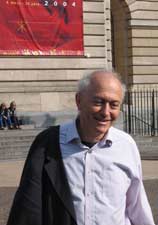Berkeleyan
Empedocles, Plato, et al. offer insight into a question of moment
Sather Lectures will trace the creationist debate back to ancient Greece
![]()
| 16 September 2004
 David Sedley |
A renowned and prolific scholar of ancient philosophy, Sedley plans, not surprisingly, to look back in time — back before the Big Bang theory, Darwin’s Origin of Species, and even the Church Fathers — to philosophers and physicians who began the West’s conversation about the origins of life, mostly in defense of creationism in some form. “Many Greeks recognized that the world is teeming with evidence of beneficial order,” he has written, “from the cycle of seasons down to the minutest details of individual life forms. How is this comprehensively ordered cosmic structure to be explained?”
On Wednesday, Sept. 22, Sedley will begin his series of six talks, titled “Creationism and Its Critics in Antiquity,” with a focus on the mid-5th-century BCE philosopher Anaxagoras. In five subsequent evenings, he will follow the speculation and debate chronologically over 800 years, through Socrates and Plato (creationists both), the atomists and Aristotle (members of the opposition), to the eminent ancient physician Galen, who — soon after the life of Christ — used all his medical knowledge to argue on behalf of divine intelligence.
Sather Lecture Series, Fall 2004 |
The British scholar — a one-time student of and later a collaborator with Berkeley classics professor Anthony Long — finds it “appropriate” to be offering this philosophical survey in the United States, where the struggle between creationism and evolution “is very much alive. I don’t think that’s true of any other country in the world. In Britain the evolutionists are generally perceived as having won.”
Though he counts himself in the latter camp, along with most of academia, Sedley will invite members of the audience to park their persuasions, of whatever stripe, at the lecture-hall door, so as to better enjoy the benefits of his field. “The object of the exercise is not to vindicate or condemn the philosophers in question, but to think yourself sympathetically into their position, to find out what it would be like to believe things that you yourself may well not believe. It’s intellectually liberating, as well as historically enlightening, to put yourself in their position and think the issues through with them.”
The Sather Professorship of Classical Literature, established by campus benefactor Jane K. Sather, brings distinguished classical scholars to campus for a semester, during which they teach and deliver a series of lectures on a subject of their choice. Each set of lectures is then published in book form by the University of California Press. To learn more about David Sedley, the 91st Sather Lecturer, and his upcoming talks, see the Department of Classics website (ls.berkeley.edu/dept/classics) and select the featured link at
top left.

